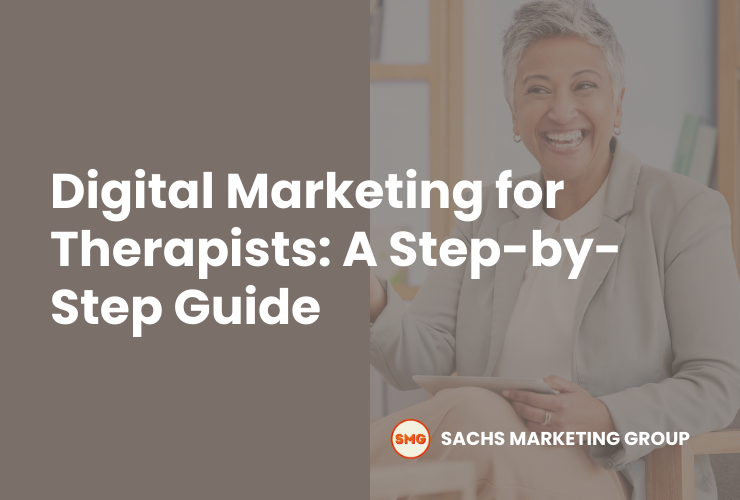Digital marketing for therapists encompasses a range of online strategies aimed at increasing the visibility of a therapy practice. From website optimization and SEO to social media engagement and email marketing, these tactics help therapists attract more clients. A well-executed digital marketing plan can greatly enhance the practice's online presence, making it easier for prospective clients to find and engage with their services.

Effective digital marketing for therapists can help skyrocket your practice to new heights, enabling you to help more people than ever before.
It can be difficult to invest time in digital marketing when you’re juggling client sessions, administrative tasks, and maintaining a healthy work-life balance. Between SEO and PPC advertising to social media and reputation management, digital marketing may seem just too out of reach.
Fortunately, we have a step-by-step guide on digital marketing for therapists that will help break down the essential strategies of digital marketing and provide you with a clear path forward.
Overview
Digital Marketing for Therapists: A Step-by-Step Guide
You may be an expert in cognitive behavioral therapy or psychoanalysis, but digital marketing is an entirely different beast.
You probably use search engines and social media as much as anyone else, but you probably aren’t familiar with the latest algorithm changes, best practices, and cutting-edge strategies proven to work.
You can spend a lot of time researching this stuff, so we thought we might be able to help by providing a clear overview that offers a path forward.
Here’s a step-by-step guide on digital marketing for therapists to help you get started:
Step 1: Define Your Brand
When it comes to digital marketing for therapists, defining your brand is the first and perhaps most crucial step. A brand isn't just a logo or a catchy slogan; it's how you present yourself to the world and how the world perceives you in return.
Your brand should communicate your unique selling proposition, which sets you apart from other therapists. For example, you might specialize in couples therapy using a particular method or have unique expertise in treating certain mental health conditions.
Knowing your niche and unique selling proposition allows you to target your digital marketing efforts more effectively.
For example, if you specialize in cognitive behavioral therapy for anxiety disorders, your branding should make that focus clear, attracting potential clients who are specifically looking for your expertise.
In a crowded market, a well-defined brand can be the difference between a potential client choosing you over another therapist.
Branding extends to everything from the colors and images you use on your website to the tone and content of your blog posts. These elements should be consistent across all your digital marketing materials, creating a coherent and instantly recognizable brand image. Remember, consistency is key in brand recognition.
Step 2: Create a Professional Website
In the age of digital marketing for therapists, having a professional website is as essential as having a license to practice. Your website serves as a digital business card and the first point of contact for many potential clients.
The design should be clean, easy to navigate, and aligned with your brand’s colors and logo. For example, if your brand colors are soft and calming, those should be the colors dominating your website to create a cohesive experience.
Beyond aesthetics, your website should also be functional and informative.
It needs to provide all the essential information a potential client might look for: services offered, treatment approaches, client testimonials, and easy ways to get in touch. Make sure to have a blog section where you can showcase your expertise and provide value to site visitors.
Lastly, ensure that your website is mobile-friendly. A large percentage of web traffic comes from mobile devices, and Google even uses mobile-friendliness as a ranking factor. If a potential client can't easily navigate your site on their smartphone, you risk losing them to a competitor.
Step 3: Invest in SEO to Increase Search Engine Visibility
Search Engine Optimization (SEO) is a cornerstone in the world of digital marketing for therapists. Investing in SEO means making changes to your website and creating content that helps you show up in search engines like Google when someone looks for the services you offer.
For example, if you specialize in relationship counseling in Chicago, you'd want your practice to show up when someone Googles "relationship counselor in Chicago."
But SEO goes beyond just inserting keywords into your content. It involves technical aspects like improving website loading speed, making sure your site is secure and accessible, and obtaining backlinks from reputable websites. Content creation is another significant aspect of SEO. Regularly updating your site with valuable, original, and relevant content can dramatically increase your visibility on search engines.
Monitoring your SEO efforts is equally important. Tools like Google Analytics can provide valuable insights into how people are finding your website and what they're doing once they get there. Use this data to continuously tweak and improve your SEO strategy, thus ensuring your practice stays at the forefront of search engine results.
Step 4: Develop and Deploy Your Content Strategy
A robust content strategy is a critical component of digital marketing for therapists. The purpose is twofold: to position yourself as an expert in your field and to provide valuable, actionable information for your potential and current clients. To do this, you'll need a mix of blog posts, videos, podcasts, and other forms of content that addresses the pain points and needs of your target audience. For example, if you specialize in child psychology, you might write blog posts about recognizing signs of anxiety in children or how to foster emotional intelligence.
Planning is critical to the success of your content strategy. Create a content calendar to manage what will be posted, where it will be posted, and when. This ensures a consistent posting schedule, which is essential for keeping your audience engaged and attracting new visitors to your website.
Lastly, always remember to optimize your content for search engines. SEO is not just for your service pages; it applies to your blog and other content, too. This means using relevant keywords naturally throughout your content and making use of meta descriptions, headers, and tags for better visibility on search engines.
Step 5: Build Your Email List
Email marketing is a highly effective form of digital marketing for therapists. Why? Because it offers you a direct line to potential and current clients. But to make email marketing work for you, you need to build a robust email list. This could be through offering a free e-book or consultation in exchange for an email address. For example, you could offer a free e-book on "Managing Stress During a Crisis" to attract new subscribers.
Once you have a list, the next step is to segment it based on specific criteria like client needs or where they are in the customer journey. For example, you wouldn't send the same email to someone who just subscribed as you would to someone who's been a client for months.
Then comes crafting the emails. These should be aligned with your brand voice and offer value to the reader. Remember, the goal is to move them through the customer journey—from a new subscriber to a regular client. Over time, a well-executed email strategy can result in increased bookings and client loyalty.
Step 6: Build Your Social Media Following
Social media can't be ignored in any conversation about digital marketing for therapists. Platforms like Facebook, Twitter, and especially Instagram offer a unique opportunity to engage with your audience in a more informal setting. For example, you could use Instagram Stories to give a behind-the-scenes look at your practice or share testimonials from satisfied clients.
While it's tempting to be on all platforms, focus on 2-3 where your target audience spends most of their time. Consistency is key, so make sure you're posting regularly and engaging with your audience through comments and messages.
You also need to create content that is engaging and shareable, thereby increasing your reach. Content could range from informative articles and how-to videos to motivational quotes and client success stories. Always aim to provide value, and the followers will come.
Step 7: Attract Positive Reviews Online
Positive online reviews can serve as powerful word-of-mouth marketing in the digital age. They add credibility to your practice and can be a major deciding factor for potential clients. For example, a series of glowing reviews on Google can significantly influence a person who's searching for a therapist in your area.
Encourage satisfied clients to leave reviews on Google, Yelp, and other platforms where people might search for your services. However, be sure you're adhering to your industry's ethical guidelines and privacy policies when asking for reviews. To make it easy, provide them with a direct link to your review profiles.
Responding to reviews is equally important—both the good and the bad. Thank people for their positive reviews and address any negative feedback professionally and promptly. Negative reviews, if handled well, can demonstrate your commitment to customer satisfaction and can sometimes be turned into a positive.
Step 8: Run PPC Advertising
Pay-per-click (PPC) advertising is a more immediate form of digital marketing for therapists. Unlike organic search, which takes time to build, PPC ads can start driving traffic to your website as soon as you set them up. For example, if you want to focus on attracting more clients for your family counseling services, you can set up Google Ads to appear when someone searches for “family counseling near me.”
The key to PPC is to focus on the right keywords. These should be closely related to your services and targeted to your specific audience. But don't just set it and forget it; PPC requires regular monitoring to ensure you're getting a good return on your investment.
In addition to Google Ads, consider other platforms like Facebook and Instagram for your PPC campaigns. Each has its own set of advantages and can help you reach a different segment of your target audience.
Step 9: Track Results and Adapt
The work doesn't stop once your digital marketing strategies are in place. Constant monitoring is essential to understand what's working and what's not. For example, you may find that your blog posts about cognitive behavioral therapy are generating the most traffic. This is a sign to produce more content around that topic.
Use tools like Google Analytics and other data analytics software to keep tabs on your campaigns. Track key performance indicators like traffic, bounce rate, and conversion rate. Based on this data, adjust your strategies as needed to maximize your ROI.
Step 10: Hire a Digital Marketing Agency
If all this seems overwhelming, consider hiring professionals like Sachs Marketing Group, who have over a decade of experience handling digital marketing for therapists. From creating a professional website and SEO to managing your social media profiles and PPC campaigns, they can handle every aspect of your digital marketing strategy.
While it's possible to manage your own digital marketing, doing it all can become too much, especially when you're also trying to run a practice. An agency can bring in expertise and strategies you may not have considered, and most importantly, free up your time so you can focus on what you do best—helping people.
Let Sachs Marketing Group Handle Your Digital Marketing
Overwhelmed by digital marketing while running your therapy practice? Sachs Marketing Group is here to help!
Sachs Marketing Group is a digital marketing agency with over a decade of experience in digital marketing for therapists. We can boost your online presence, attracting more clients to your practice.
We offer comprehensive services tailored to your needs, from SEO to social media, freeing you to focus on your clients.
Take the first step towards a more successful practice. Contact Sachs Marketing Group today for a free consultation.
Get a free, no obligation review of your digital marketing strategy!
"*" indicates required fields





